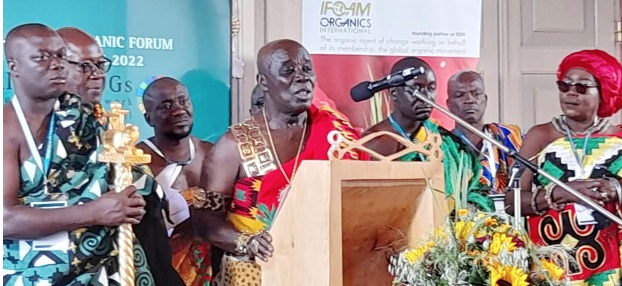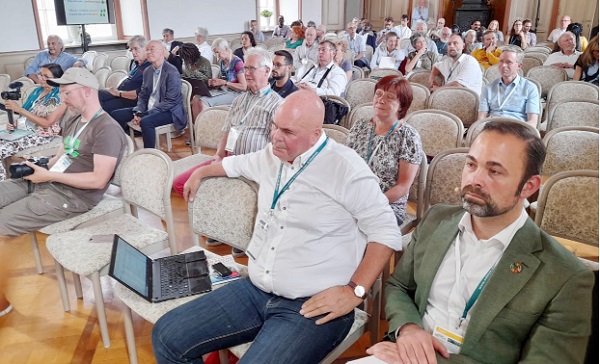
Support farmers to advance organic farming: Okyenhene advocates at World Organic Forum
The Okyenhene, Osagyefuo Amoatia Ofori Panin, has called on African governments to support indigenous farmers to harness traditional knowledge in organic farming.
Doing that, he said, would help advance international efforts against global warming and safeguard the environment in sustainable ways.
Advertisement
“Indigenous farmers must be encouraged to tap into the best indigenous knowledge and practices in order to strengthen agriculture in the rural areas of Africa as the best guarantee of development for the people,” he said.
Osagyefuo Ofori Panin made the call when he delivered the keynote address at the opening of the fifth World Organic Forum in Kirchberg/Jagst, Germany, yesterday[June 28, 2022].
He spoke on the topic: “Impulse on the importance of organic farming for regional development in Ghana.”
The forum
The four-day forum, which is being held on the theme: “Localising SDGs: Creating a global network of regions on organic soil”, is focused on the local implementation of the UN Agenda 2030, with its 17 Sustainable Development Goals (SDGs), across the world.
Participants at the forum included organic food agricultural experts and representatives of civil society organisations, members of academia and farmers from Germany, Ghana, India, Italy, Tanzania, Uganda, Romania, Bangladesh and Norway.

Discussions featured, among others, how to implement successfully the 17 goals in rural areas through a bottom-up approach and the building blocks needed for regional planning of the SDGs and how to measure them.
It is being organised by the Akademie Schloss Kirchberg, a renowned German institution focused on training on and promoting organic agriculture.
Sustaining traditional knowledge
Adorned in a rich Kente cloth, the Okyenhene, who was accompanied by some traditional leaders in the Akyem Abuakwa Traditional Area, said before the advent of “so-called modern farming methods”, indigenous farmers cultivated good food crops using organic materials in all the phases of production, harvesting, preservation and preparation of food.
He said local farmers had their own organic and biological fertiliser, ecological-based pest control materials made from organic human, animal and plant waste compost that were effective and safe.
“It is through the basic indigenous knowledge of organic agriculture within our own age-old methods that African societies have been sustained for centuries and these need to be sustained and expanded to meet contemporary standards of our needs.
“If efforts are to be made to produce more for the people and export in a way that does not damage the earth’s environment, our own bodies and livestock, we have no alternative but to embrace organic farming,” he stated.
Harmful practices
He expressed worry over the fact that current food production was being threatened by harmful human practices.
“Today, the food we eat, the water we drink, the air we breathe which form our life support system are being threatened by reckless over-exploitation of resources, irresponsible mining and consistent spread of toxic chemicals in the soil from which our food grows.
“In the end, poor indigenous people eat food that may have poisonous pesticide residues,” he said.
Research
Osagyefuo Ofori Panin urged African governments to research into indigenous knowledge systems for the sustainable production of food and cash crops.
In doing that, he said, care should be taken not to import ideas and methods that worked elsewhere but might not work for Africans.
“We must be partners in developing the standards by which organic food is marketed around the world and the effort at changing attitudes must be global, both in form and content, because that is the only way to ensure that a fair exchange of ideas can take place,” he said.
The Okyenhene advocated the elimination of the use of synthetic fertiliser and pesticides, veterinary drugs, genetically modified seeds and breeds, preservatives, additives and irradiation in farming.
“The aim of organic practices in agriculture and food management systems calls for a replacement of harmful materials with site-specific management practices that maintain and increase long-term soil fertility and prevent pests and diseases.
“Ghanaian farmers and agribusiness entrepreneurs who export to Europe and other places are aware that organic products sell more and can be kept for much longer because they do not have the harmful effects of toxic pesticides and chemical fertiliser,” Osagyefuo Ofori Panin said.
Organic farming & SDGs
The Senior Manager of Global Policy of the International Federation of Organic Agriculture Movements (IFAOM)-Organics International, Gabor Figeczky, said since organic farming was one of the major contributors of the SDGs, his outfit was working in many countries to grow organic agriculture in a sustainable manner to be at par with conventional farming.
That, he said, would aid in local implementation of SDGs to promote good health and well-being (SDG 3), clean water and sanitation (SDG 6), responsible consumption and production (SDG 12), climate change (SDG 13), life on land and below water (Goal 15), among others.
The Founder and Chairman of Akademie Schloss Kirchberg, Rudolf Buhler, said advancing local anchoring of the SDGs in a practice-oriented manner would help promote the sustainable management of food supply and national resources, instead of their exploitation




